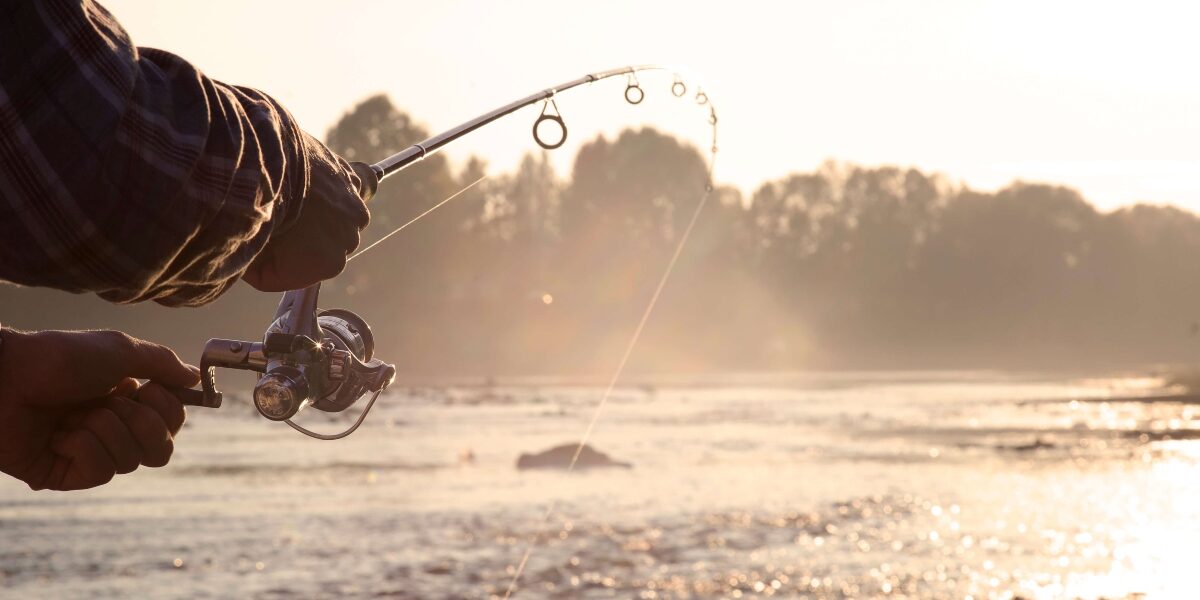Mortimer and Whitehouse might not be with you while you’re out there on the lake’s edge, but the duo’s spirit of fun surely will be. Fishing has been in the spotlight over the last couple of years thanks to that really warm and friendly TV show, which has inspired many to give the pastime a go. But for those who have partaken of the art for longer, it’s never been a secret just how relaxing and enjoyable a pursuit it is.
Fishing is, of course, a wonderful way to keep on top of your physical health (there’s usually walking involved) and, also important, your mental health. It’s a perfect way to de-stress from the petty irritations of life, or to take some quiet time and open space to think about the bigger issues you might be facing. It’s also a great way to give yourself a chance to commune with nature. Fishing can also mean quality time spent connecting with family and friends, enjoying the gentle camaraderie that goes with it.
Discovering great fishing locations within easily travelling distance from one of our holiday parks is easy. The UK has so many fishing spots to choose from that you could more or less stick a pin in a map and find somewhere no more than just a few miles away. So that you can stick a virtual pin in a virtual map, here are some useful websites. They’ll give you some good guidance on possible sites for planning some fishing before you come to one of our parks: the Canal and River Trust, the Angling Trust and Fish Buddy.
If you’re coming to one of our parks and planning to go fishing and it’s your first time, what are the things you need to know? What gear do you need, and do you need to be licenced?
1. Gear
That old saying “all the gear, no idea” is often applied to those who partake in sports and pastimes for the first time and come along fully kitted out with expensive brand-new gear. Our advice is that if you’re a first-timer or a novice who is unlikely to fish regularly once you’ve gone back home from your break at one of our holiday parks, you should borrow (although you will find that a lot of anglers are quite proprietorial about their hardware).
The cost of getting yourself fully equipped can be prohibitive, it’s not a small investment to make – though there are budget rods and gear which might do the trick for you in your early days of fishing. Just enough to give you the bug, anyway. Some angling clubs will rent a rod and other gear to you – so check them out as that can be an economical way to get into fishing.
Here is our list of essentials:
- Rod and reel
- Line
- Tackle
- Bait and lures
- Net
- Tackle Bag
- Protective / waterproof clothing
- Sandwiches and a flask of hot drink!
- Fishing Licence
2. Fishing Licence
If you are aged 13 or over, you need a fishing licence to fish for salmon, trout, freshwater fish, smelt or eel with a rod and line in England (except the River Tweed), Wales and the Border Esk region, including the parts of the river that are in Scotland. You don’t need a licence to fish with rod and line anywhere else in Scotland, though you will need permission from the landowner or an angling club. The penalty for fishing in the UK without a licence is not to be sniffed at as it can be quite severe. If you are caught you could face a fine of up to £2,500 if you cannot show a valid rod fishing licence when asked. It’s always good sense to buy a fishing licence before you set off on your holiday.
Fishing licences for children aged between 13 and 16 are free. Above 16 years of age and you must pay. You can buy a one day (between £6 and £12), an eight day (between £12 and £27) or a twelve month licence (between £32 and £82, though with concessions for the over-65s or disabled). Each licence price depends on the type of fish you’re fishing for and the number of rods you use.
You will also need to gain permission from the landowner to fish on private land, and an additional licence to fish in locks or weirs on the River Thames. You must follow national and local rules (byelaws) when freshwater fishing with a rod and line in England and Wales. The licensing pages at the government’s website also detail conditions regarding the types of rod you can use for the different types of fish you are fishing for. Check here so that you remain in compliance with the law.
Buy your licence here.
At Daly Parks, we have many static caravans for sale in Cumbria or nearby – at our Scout Cragg Holiday Park in the Arnside and Silverdale Area of Outstanding Natural Beauty, or at the Willow Tree Holiday Park, which is carefully positioned on the edge of the Lake District. Our static caravans at Grange Over Sands and Scout Cragg are great spots to use as a base for any break involving angling. There are some wonderful fishing spots around these parks, and you can find them, and plan your fishing holiday (or even just a couple of days during a break when you have other plans too) by using the websites mentioned earlier in this article.
A fishing trip is something you’ll definitely enjoy if you’re looking to take life a little easier without just stagnating in a deckchair. As Mortimer and Whitehouse say: And away…


